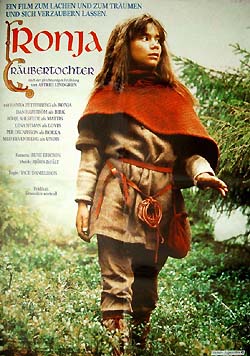Ronia, the Robber's Daughter (film) facts for kids
Quick facts for kids Ronia, the Robber's Daughter |
|
|---|---|

German film poster
|
|
| Directed by | Tage Danielsson |
| Produced by | Waldemar Bergendahl |
| Written by | Astrid Lindgren |
| Starring | Hanna Zetterberg Dan Håfström Börje Ahlstedt Lena Nyman |
| Music by | Björn Isfält |
| Cinematography | Rune Ericson Mischa Gavrjusjov Ole Fredrik Haug |
| Editing by | Jan Persson |
| Release date(s) | 14 December 1984 (Sweden) |
| Running time | 126 minutes |
| Country | Sweden |
| Language | Swedish |
| Budget | SEK 18,000,000 (estimated) |
| Money made | SEK 49,396,838 (Sweden) |
Ronia, the Robber's Daughter is a Swedish fantasy film released in cinemas on December 14, 1984. In Sweden, it is known as Ronja Rövardotter. The movie was directed by Tage Danielsson. It is based on the popular 1981 novel of the same name by Astrid Lindgren. Lindgren herself wrote the screenplay for the film.
When the film was shown on TV two years later, it was longer. This TV version was also uncensored. This led to a discussion about whether movies were more harmful in cinemas than on television. The film was chosen to represent Sweden at the 58th Academy Awards. It was considered for the Academy Award for Best Foreign Language Film, but it was not nominated.
Besides this live-action film, there is also a cartoon version. This animated series was produced by Gorō Miyazaki at Studio Ghibli. The story in the cartoon is very similar to the original film.
Contents
Story of Ronia, the Robber's Daughter
The film tells the story of Ronja, the daughter of a robber chief named Mattis. She becomes friends with Birk Borkasson. Birk's father, Borka, leads another robber gang. Borka is Mattis's biggest rival and enemy.
Ronia's Early Life
The movie begins at Mattis's castle. Mattis (played by Börje Ahlstedt) is Ronja’s father. Lovis (played by Lena Nyman) is Ronja’s mother. There is a big lightning storm outside. Lovis is about to give birth to Ronja (played by Hanna Zetterberg).
The story then jumps forward ten years. Ronja is now old enough to explore the wild forest. Mattis is the leader of a group of friendly robbers. He warns Ronja about the dangers she might face in the wilderness. Despite his warnings, Ronja goes on adventures. She meets the dangers her father told her about.
Rival Robber Clans
Another group of robbers lives nearby. Their leader is Borka (played by Per Oscarsson). Mattis believes the forest around his home belongs only to his gang. He thinks Borka's gang should not be there. Mattis gets even more upset when Borka moves his people into the castle. Borka's gang starts living alongside Mattis's people. Because of this, Mattis plans to make Borka's group leave the forest.
Ronja and Birk's Friendship
Borka has a son named Birk (played by Dan Håfström). It turns out that Birk and Ronja share the same birthday! At first, Ronja and Birk are enemies, just like their fathers. But over time, they become good friends.
The weather is often bad, and their parents hate each other. Despite this, Ronja and Birk meet up several times. Mattis tries to force Borka's group away by kidnapping Birk. But Ronja openly supports Birk. This act makes Ronja and Birk run away from their families. Their parents refuse to stop being enemies.
Main Characters
- Hanna Zetterberg as Ronja
- Dan Håfström as Birk
- Börje Ahlstedt as Mattis (Ronja's father)
- Lena Nyman as Lovis (Ronja's mother)
- Per Oscarsson as Borka (Birk's father)
- Med Reventberg as Undis (Birk's mother)
- Allan Edwall as Skalle-Per (an old robber)
- Ulf Isenborg as Fjosok
- Henry Ottenby as Knotas
- Björn Wallde as Sturkas
- Tommy Körberg as Lill-Klippen
Other Versions of the Story
The story of Ronia, the Robber's Daughter has been made into other things.
Animated Series
There is a cartoon series with a similar name, "Ronja, the Robber's Daughter." This animated show tells the same story as the film.
Other Adaptations
You can also find an English version of the film. There is even a lullaby based on the movie. A play with the same title was written by Allison Gregory.
Awards and Recognition
The film won some important awards and was recognized for its quality.
Film Festival Awards
It won the Reader's Jury prize from the Berliner Morgenpost newspaper. The film also competed for a Golden Bear award at the 35th Berlin International Film Festival in 1985. A Golden Bear is the top prize at this famous film festival. At the festival, the film was given a Silver Berlin Bear. This award was for its amazing artistic contribution.
Academy Award Consideration
The film was also considered for the 58th Academy Awards. It was put forward as one of the best Foreign Language Films. Even though it was not chosen as a final nominee, being considered showed that it was a very good movie.
 | Victor J. Glover |
 | Yvonne Cagle |
 | Jeanette Epps |
 | Bernard A. Harris Jr. |

